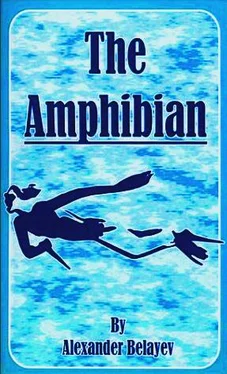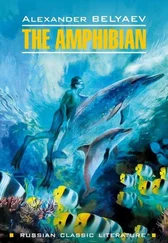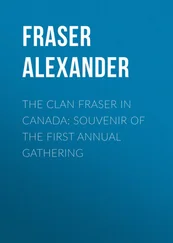“Why, nothing could be easier. No authorities around, the whole prison’s at your disposal.”
“Splendid. And there’s one thing more.”
“I’m at your service.”
“In freeing Ichthyander youll be doing me an immense service — ”
“But you, Professor, you’ve done a lot for me, too.”
“All right, well consider we’re quits,” Salvator interrupted him. “Now, I want to help your family. Here, take this note. It’s just an address, signed with the letter ‘S’ for Salvator. If you’re ever in need of shelter or money remember the address. You can trust the man.”
“But-
“No buts, please. Now take me to Ichthyander.”
Ichthyander was surprised to see Salvator entering his cell for a second time that day. He was even more surprised when he caught his glance, at once sad and tender as never before.
“Ichthyander, my son, listen to me,” said Salvator. “We’re going to part soon, sooner than I expected, and perhaps for very long. Youll get your freedom tonight but I’m still worried about you. If you stay here you might become the slave of Zurita or some other brute like him-” “But what about you, Father?”
“Ill be convicted, of course, and tucked away for a stretch of two or more years. You must tide over it in a place both safe and far away. There is such a place, but very far from here, beyond South America, on one of the Tuamotu or Low Archipelago islands in the Pacific. Youll not find it easy getting there and locating the spot but all the hazards you’re likely to encounter will be nothing compared to the risks you’d run dodging your enemies’ traps here, in the Rio de la Plata.
“Now about your route. You can get there, travelling round South America, either the southern or the northern way. Both routes have their advantages and disadvantages. The northern route is somewhat longer. Besides, you would have to pass through the Panama Canal, which is dangerous. You may be caught, particularly in the locks, or crushed to death by a ship. The canal is rather narrow and shallow. It is 500 feet at the widest and only 45 feet deep, so that the modern ocean-going vessels all but scrape the bottom with their keels.
“On the other hand, you’d be travelling in warm seas. Besides, three major shipping lines run westwards from the Panama Canal: two of them to New Zealand, the third to the Fiji Islands and farther. Choosing either of the New Zealand lanes and following the ships or even getting a ride on them would bring you almost to your destination. You’d only have to head a little more to the north and you’d be there.
“Now the southern route is shorter but you’d swim in colder waters, near the northernmost ice floes, especially if you went round Cape Horn. And you’d be ill advised to try to negotiate the Strait of Magellan. It’s much too stormy. It used to be a veritable graveyard for sailing-ships and is still considered very dangerous, particularly on the western side where it’s narrower and reef-ridden. Constant westerners of gale force drive the water before them so you’d have to swim upstream and across whirlpools that even for you might prove fatal.
“And that brings us back to the Cape Horn variant, even if it is longer. There’s the cold-water snag, too, but I hope you’ll get conditioned as you go and remain in good health. As for food youll have plenty of that in any part of the ocean.
“And then, of course, it’ll be a bit more difficult for you to find your way to the Tuamotu Archipelago from down there than from the Panama Canal. There’ll be no busy shipping lines to guide you. But youll have the place’s bearings and will be able to get sun fixes with a set of instruments I made specially for you. I’m afraid they might be quite a burden-”
“I’ll take Leading with me. Hell carry anything there is to carry. I don’t want to leave him behind, anyway. He must be missing me awfully.”
“I wonder who’s missing whom worse,” Salvator smiled. “Well, that’s settled. Splendid. When you get to the Tuamotu Islands, look for a solitary coral-fringed island. You will know it by a long mast with a big fish for a weathercock on its top. You can’t miss it. It might take you one, two or even three months to find it but never mind-youll strike it in the end. The water’s warm there and oysters plentiful.”
Salvator had taught Ichthyander to listen to what he said patiently, without interrupting, but here Ichthyander could not resist the sudden temptation to ask a question.
“But what shall I find on that island?”
“Friends. Kind and loyal friends,” said Salvator. “My old friend, Armand Villebois, the famous French oceanographer, lives there. I got to know and love him many years ago when I was in Europe. He’s a most interesting man but there’s no time to go into that now. I hope youll be able to make friends with him yourself and learn the story of what brought him to that lonely atoll in the Pacific. He’s far from lonely there though. His wife, a fine woman, and their two children live with him. His daughter was born on the island and should be about seventeen now, his son is older, about 25, I should think.
“They know all about you from my letters and I’m sure will receive you like one of the family — ” Salvator stopped short. “You’ll ‘have to spend most of your time in the water, of course. But youll be able to go ashore for a few hours every day. Perhaps, your health permitting, youll be able in the long run to stay as long on land as in the water.
“Armand Villebois will be like a father to you and. you in turn may prove indispensable for him in his scientific work. As it is, you know more about the ocean and its inhabitants than a dozen professors rolled in one.” Salvator smiled ironically. “Those cranks of experts questioned you — all according to the usual rigmarole — and you couldn’t answer because it didn’t happen to concern you. Now had they asked you, say, about the currents, water temperature and salinity in the Rio de la Plata and thereabouts, they would have been able to compile a fat volume of sound science out of your answers. Imagine the amount of facts you could gather-and then pass onto people-were your underwater excursions directed by such a brilliant scientist as Armand Villebois. Between him and you, I’m quite certain of it, you’ll produce a work on oceanography that will be a milestone in the development of that science. And your name will stand on the cover side by side with that of Armand Villebois — hell insist on it, or I don’t know him. Here you’d be forced to serve the base interests of ignorant grabbing people. There youll be serving science, that means the whole of humanity. And I’m sure that in the clear waters of the lagoon and at the Villebois’ you will find a haven and happiness.
“One more piece of advice. As soon as you’re in the ocean-and that should be tonight-go home immediately via the tunnel-there’’s only Jim at home-get the navigation instruments, knife and the rest, find your Leading and start on your way there and then, not even waiting for dawn to break.
“Farewell, Ichthyander, or rather, good-bye.”
Salvator embraced and kissed Ichthyander, which he had never done before. Then he smiled, patted Ichthyander on the shoulder, and saying, “Youll make it all right,” he left the cell.
Just back from the factory after the day’s work Olsen was sitting down to his — dinner when there was a knock at the door.
“Who’s there?” Olsen shouted resenting the interruption. The door opened to admit Gutierrez.
“Why, it’s Gutierrez! Well, well! “ Olsen exclaimed, at once surprised and pleased, getting up from his chair.
“Hullo, Olsen,” she said. “Go on with your dinner, never mind me,” and leaning against the closed door, she said: “I couldn’t live any longer with my husband and his mother. Zurita-he dared to strike me. So I left him. I’ve left him for good, Olsen.”
Читать дальше










